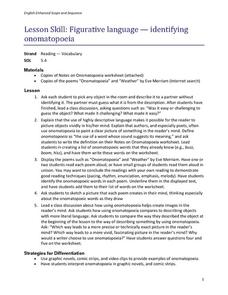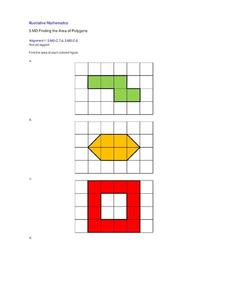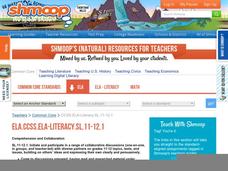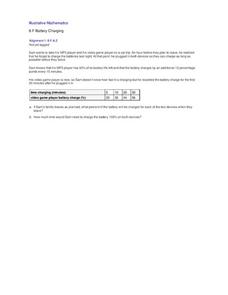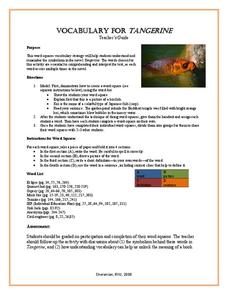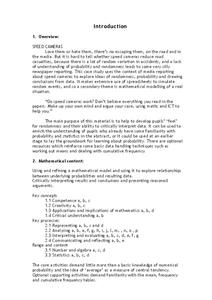Curated OER
Communication, Day 5: Saying "No"
There are many ways to say, no. Secondary special needs students need to know when and how to say no when they feel they are in an uncomfortable situation. They sign, say, and role-play how to say no. Worksheets and role-playing cards...
Curated OER
WonderFoam Collagraph Prints
Experiment with your very own printmaking blocks using foam sheets! Your class can create a beautiful pattern on their stamp with various shapes, symmetrical or not. Printing these might resemble Italian or Spanish tile patterns, or a...
Curated OER
Figurative Language- Identifying Onomatopoeia
A study of onomatopoeia for 5th graders is here for you. Pupils discover that the use of highly descriptive language makes it possible for readers to picture objects in their minds. After engaging in a class discussion and listening to...
Curated OER
Finding the Area of Polygons
Third graders are exposed to finding the area of polygons by decomposing figures and recomposing them into rectangles. This strategy allows children to expand on their prior knowledge of constructing shapes by rearranging parts into...
Sargent Art
Destination Art: Paper Mola Collage
The Kuna Indians hail from the San Blas Island near Panama. Learners will investigate their culture by creating paper mola collages, just like the ones created by the indigenous Panamanians. They'll focus on understanding the symbolism...
Sargent Art
Rainsticks
This rainstick lesson isn't just about making art; it's about understanding Native American symbols and culture. Kids read about the use of rainsticks and why specific symbols were used to decorate them. They then make their own...
Curated OER
From George to Martha: Writing a Sonnet Using Primary Sources
What was the relationship like between George and Martha Washington? To protect their privacy, Martha Washington destroyed all her husband’s letters after his death so historians have little evidence of their lives together. Two letters...
Shmoop
ELA.CCSS.ELA-Literacy.SL.11-12.1
You want your class to meet all of the Common Core standards, and here is one way to tackle the first speaking and listening standard. Given a theme to focus on from "How Much Land Does a Man Need?" by Leo Tolstoy, small groups come up...
Illustrative Mathematics
Battery Charging
Your class will be very interested in the results of this activity. How long does it take a MP3 and video game player to charge? Sam only has an hour and the MP3 player only has 40% of its battery life left. Plus, his video player is...
Sargent Art
Rainforest Mural
Whether you are an art teacher or a teacher looking for a great project to finish off a unit on the rainforest, this instructional activity is for you. Here are some great teaching tips and instructional practices that can help you and...
National Gallery of Canada
Build a Neighbourhood
What's special about your neighborhood? Build one with your class to find out. Individuals create their dream homes that, when completed, will be placed together around a green space in order to create a neighborhood. Learners also...
Dick Blick Art Materials
Natural Twig Journals
Connect science, art, and language arts with a nature-themed bookmaking project. Kids craft book covers, cut paper for pages, and learn how to bind their creations.
Curated OER
Tangerine: Vocabulary
Here's a great way to make vocabulary words drawn from Edward Bloor's novel Tangerine memorable. Kids create a word square, and in one quadrant write the word. A picture goes in a second quadrant, the definition in a third, and a...
NASA
Discovering the Milky Way
What do you call a tiny collection of galaxies? A puny-verse! Young scholars graph data gathered by scientists studying Cepheids. They attempt to identify a relationship between the variables through standard and logarithmical graphing....
Bowland
Fish Dish
Minimize the time it takes to create a fish dish. Scholars use their knowledge of time to devise an order that accounts for different constraints. Considering jobs that can be done in parallel is essential to solving the problem.
Bowland
Speed Cameras
Do speed cameras help reduce accidents? Scholars investigate this question using a series of spreadsheet activities. Along the way, they learn about randomness, probability, and statistical analysis.
University of Colorado
Are All Asteroids' Surfaces the Same Age?
There are more than 600,000 asteroids in our solar system. Pupils analyze images of two asteroids in order to determine if they are the same age. They count craters for each asteroid and compare numbers.
Seussville
Oh! the Places You'll Go!
Honor Dr. Seuss on his birthday with a read aloud of the story Oh! the Places You'll Go! and a variety of activities that inspire scholars to dream of their future endeavors. Readers take part in conversations, research the life of...
J. Paul Getty Trust
Tag: Whose Values
Get young people thinking about their lives and current topics of social justice, advocacy, gender, race, and identity. After examining several works by Barbara Kruger, participants select a tag with one of the questions printed on it,...
Texas Education Agency (TEA)
Byzantine Architecture
View Byzantine architecture from the comfort of your classroom. A PowerPoint presentation introduces important vocabulary terms and examples of Byzantine architecture in the ninth lesson plan of the 11-part series. A Jeopardy game...
Nuffield Foundation
Investigating Factors Affecting the Heart Rate of Daphnia
What variables change heart rate? Young scientists observe the beating heart in Daphnia to understand these variables. They make changes in temperature, chemicals, and other factors as they graph the heart rates. Analysis questions help...
Kenan Fellows
Electricity: Sources, Usage, Challenges, and the Future
What does the future of energy look like? Junior engineers collaborate to discover a solution to the global energy crisis during a very hands-on instructional activity. The unit focuses on learning through collaboration to develop a deep...
Poetry4kids
Evoking the Senses in a Poem
Budding poets choose a topic for a sensory-filled poem. Authors describe that topic using detailed language based on the five senses. Then, switch the senses to create a fanciful poem intended to add a touch of fun to the objective.
Utah Education Network (UEN)
8th Grade Poetry: Narrative Poem
The first lesson of a five-lesson unit designed for eighth graders has class members reading and watching a video of Edgar Allen Poe's narrative poem, "The Raven." They then craft their narrative poem, illustrate it, and share their work...
Other popular searches
- Pastel Drawing Techniques
- 3d Drawing Techniques
- 2 D Drawing Techniques
- Pencil Drawing Techniques
- 3 D Drawing Techniques
- Beginning Drawing Techniques
- 3 D Drawing Techniques
- Drawing Techniques for Art
- Drawing Techniques Face
- Drawing Techniques Grid




